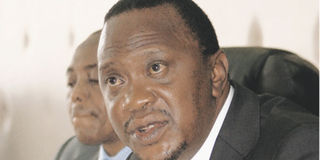Uhuru faulted on testifying at ICC

Deputy Prime Minister Uhuru Kenyatta at a past press conference in Nairobi. Lawyers have described Mr Kenyatta’s decision to take the witness stand as a risky move. Photo/FILE
What you need to know:
Accused set for hearings:
- September 21: The defence, victims’ lawyer and the prosecution to give their opening statements.
- September 22-23: Prosecution to present evidence.
- September 24-October 4: Defence to present its evidence challenging the prosecution.
The dramatic decision by Deputy Prime Minister Uhuru Kenyatta to take the witness stand at the International Criminal Court is being seen by some lawyers as a risky move.
Mr Kenyatta’s move means that he presented a sworn statement with the chamber, which will be used by the prosecution in asking him questions. (Read: Uhuru to take witness stand at ICC hearings)
By his decision, the Deputy Prime Minister is the first of Kenya’s six suspects to take to the witness stand in his own case, a move seen as a big gamble.
This came as Mr Kenyatta’s co-accused, postmaster-general Hussein Ali asked the Pre-Trial Chamber II to allow him to replace one of his witnesses for “unforeseen circumstances”.
Mr Kenyatta made a similar request, which was accepted, and it is after this that it emerged that he will be his own witness.
Mr Kenyatta’s defence has been at the forefront of challenging the prosecutor’s document containing charges, arguing that it has introduced new allegations to his charges.
The Deputy Prime Minister had even asked the court to postpone next week’s hearings by three months before withdrawing the request.
Lawyer Paul Mwangi described the decision as premature.
Mr Mwangi on Thursday told the Nation that it is unwise and potentially dangerous for the defence to allow a suspect to take the stand since they had “not seen the whole of the prosecution case”.
He said the prosecutor has only released the minimum evidence required at this stage.
“He is opening himself up for cross-examination and that is risky because you don’t have control of questions. You may say things that might contradict your defence in future. Mr Kenyatta may also say things that might prove politically expensive such as comments relating to violence in the Rift Valley,” said the lawyer.
Human rights lawyer Priscilla Nyokabi also faulted Mr Kenyatta’s decision to take the stand on his behalf.
This may expose him to the prosecution as “the burden of proof shifts to him”, she added. “We see it as a move that is likely to excite passions among various communities and especially victims,” said Ms Nyokabi.
She further said that the move would see him take “the antagonistic role”, which would be unwise given the judges’ warnings to the first group of suspects last week.
She also said that Mr Kenyatta should have left his lawyers to do the work at this stage.
Senior counsel Paul Muite said it is a hit or miss move that could rescue Mr Kenyatta or seal his case.
“With deference to the decision arrived at by his lawyers, it’s a dangerous move. The prosecutor and the court has a lot of redacted (edited) information,” he said.




